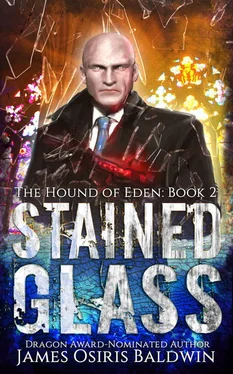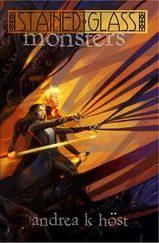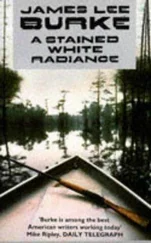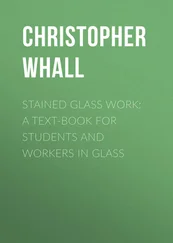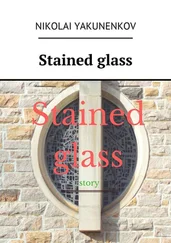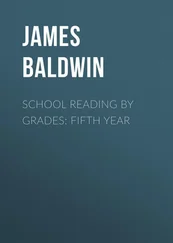“Fucking hell.” I heard the wardrobe bang open as Jenner went to search for something to cover herself. “They’re just going to have to take our word for it, then.”
My eyes were hot as I pulled open the dresser and rifled through Vassily’s underwear, clean and untouched since he’d died. There was a money clip in there, monogrammed but empty. I added it to the collection of his tokens in my pocket. “Get out. I’ll finish up in here.”
“Whatever.” I heard a rustle, and then Jenner strode out past me into the hall, slinging a trench coat around her shoulders. I pocketed what I could, took what photos I could carry, and picked up the ruined cassette. Brown celluloid tape was flammable, and I had a gas stove.
But before that, I had to get my tools.
The study was still mostly intact. To my surprise, the Wardbreaker was just lying there, unholstered, the silencer still screwed onto the barrel. I checked it over and then jammed it through my waistband. A deep tension I hadn’t known I’d been carrying ebbed away, replaced by determination.
My desk had been disemboweled, but someone had stuffed my papers and books back into the drawers and had left their own files on the desktop. Quickly, I went to the smallest of my bookshelves, a low deep-bellied shelf, and pulled out a photo album, a copy of the mishnayot, and half a dozen particularly rare books, including the copy of Das Rote Buch that Crina had pilfered for me before she’d vanished to parts unknown. My wastepaper basket had a trash bag in it: I shook the trash out, threw the books into it, and tied it shut.
The last thing I needed was in the glass hutch beside my desk, cradled on a folded rectangle of crushed purple velvet. My father’s old prison sledge. No one had touched it, which wasn’t surprising. There was something naturally unpleasant about this weapon, the hammer my father had liberated from Kolyma, the gulag where he served – and survived – for seven years. The head was fifteen pounds of cold iron, more than enough to crush a man’s head in with a single solid blow. And it had crushed a lot of heads.
The sledge thrummed with a subtle siren call, and even with my magic crippled, it still made the stubble on the back of my neck stir. It had first been imbued with my father’s desperate will, his fierce need to survive. Every iron spike he’d driven had symbolized a camp guard, a snitch, a pimp or a foreman. He’d carried the hammer and his hate with him through the German underground railroad, onto the ocean liner he and my mother took from Hamburg to New York, the ship where I was conceived. Grigori Sokolsky had terrorized the Beach – and me – with this hammer for fifteen years. I had ended his life with it, closing the circuit. The peculiar magic of sacrifice was etched into it as indelibly as my father’s prison number was burned into the wooden haft.
Reverently, I lifted it out of its case, ran my thumb over the burnished grain, and slung it over my shoulder. As the only surviving Sokolsky man, it sung its Phitonic song for me and me alone. I had been prepared to let it go, like the photos. It was too heavy and cumbersome to travel with, but the Organizatsiya had called me Molotchik after this hammer, and the Organizatsiya was going to remember why.
With the Wardbreaker, hammer, my cat, and my key grimoires, I felt better, stronger. I passed by the desk, and lifted the cover of a dirty, finger-stained Manilla folder to glance over the contents. They were informal receipts penciled in Nicolai’s rough handwriting, with a note to read the instructions for pickup and delivery. Frowning, I flipped the page.
There was a honk from outside, then another. The Tigers had spotted something.
I slapped the folder closed and shoved the entire thing into the core of the photo album inside the trash bag, grabbed the lot, and ran. As I reached the balcony exit, the front door banged open from the other end of the house. There was a burst of male laughter, and then a shout of alarm. They smelled death.
Images of my tortured cat and the red-haired girl, her wrists bleeding from the handcuffs, flashed in my mind’s eye. A tic rippled next to my mouth. I threw the glass door open on its rails, threw the books over the side, and stalked back into the house with my father’s sledgehammer in my hands.
A month ago, I’d been desperate to run from the Organizatsiya, but now I didn’t think I could – not without making them hurt first.
These men were ex-soldiers, lifetime criminals, but they were in my house.
They whirled to face me as a unit as I charged out of the laundry. They had the wrong guns for a space as small as this one: before they knew what had hit them, I was already up in the first man’s face with the hammer. I used the haft end to knock his pistol aside, the head to fend off his fist, and then rammed my forehead into his nose. Cartilage gave way with a satisfying crunch. As he stumbled away into the table, I ducked and weaved the next half-seen fist, rammed the end of the hammer into his belly below where his vest ended, and swept him up in a choke with the haft just as the other two finally opened fire. His shaven head snapped back in a bloody haze; I shoved him off into the other two, frozen with horror as they realized what they had done, and followed up behind with the sledge.
I knew their names. The corpse that slumped to the floor was named Vadim; Anatoly was the one closest to me. He instinctively tried to block the swing that broke his arm and slammed it back into his face, toppling him. Marko popped off three panic rounds at us. One hit the flak vest and staggered me like a baseball bat to the gut; the other two went wide. I gestured sharply with my hand and barked an arcane-sounding word at him: he threw his hands up in brief terror of impending magic, and then I was on him. One strike to the belly, two and three to the face, and he was down with the others.
I dropped the hammer and went to my knee to pick up a gun, bracing beside the kitchen door. We were screwed anyway, so I double-tapped each man lying on the ground. Anatoly, Marko, and Vadim. One, two, three.
“Ivanko!” I called back into the hall. “Going to come out before you burn alive?”
There was no reply. I waited until a count of seven and risked a look around the corner. The hall was empty, the front door hanging open. The only sound was the shrill whine of tinnitus in my ears.
Outside, one of the Weeders laid into the horn. I dropped the gun and broke away from the door to snatch up the hammer and cross to the stove. I hefted it up, sticking to the wall, and slammed the head of the hammer into the gasline. It broke with a high whistling noise, and then the powerful sulphuric stench of methane gas began to pour into the kitchen. I was headed back to the balcony when something flickered in the corner of my eye: Ivanko, who swung around the edge of my bedroom door and opened fire.
I barely cleared the doorway, holding my breath as bullets shattered plaster and brick veneer. He wasn’t using a suppressor, and it was loud . I careened out onto the balcony, plaster chips stinging the back of my neck, and dropped the hammer down to the sidewalk. I vaulted over the railing, found my grip on the edge, and then let go.
I glimpsed the shocked face of my downstairs neighbor as I caught the edge of their balcony, jolting my arms from shoulders to wrists, and then let go a second time. I cursed with pain as I caught the last railing, let go, and tumbled to the ground. The impact against the pavement rattled my teeth and sent me sprawling to land on my ass. I looked up and saw Ivanko high above, teeth bared in a victorious grimace. He opened fire on the street as I scrambled up and dove for cover, and got a half a burst out before the top of the building exploded.
Читать дальше
